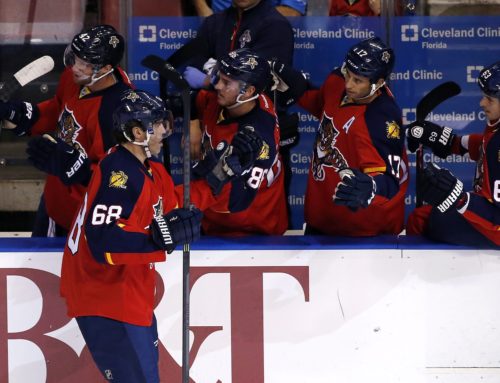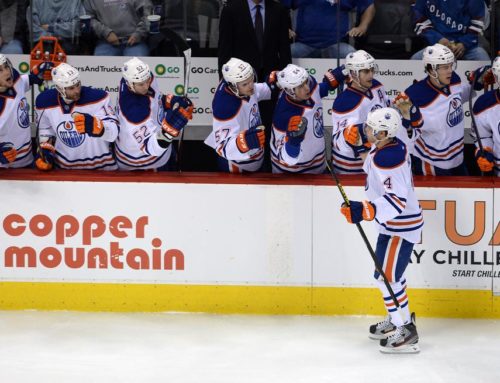
Taking a look at some of the hot topics in the analytics community.
Around the World of Analytics
It’s a wonderful time for fans of hockey analytics, with a wealth of information out there for all of us. The explosion of this community is particularly thrilling to someone who remembers when it was just half a dozen guys on three or four obscure corners of the Internet. These days, you can’t read or hear anything without at least one set of numbers.
This week I’m going to walk through just a half dozen of the most fascinating analytics stories I stumbled upon this week, most of which have at least some fantasy hockey application. Projecting the standings, Tyler Bozak, the effect different scorekeepers have on statistics, when to pull the goalie, the decline of the Los Angeles Kings, and new and adjusted versions of a popular statistic known as Corsi are all among my chosen topics. And don’t worry, we’ll be closing on a high note!
Projecting the Standings
About 30 years ago, give or take, Bill James introduced his Pythagorean formula to the world of baseball, which can calculate a team’s expected winning percentage based on its run differential.
Well, the same concept has been applied to hockey for as far back as I can remember, most recently by Neil Greenberg of the Washington Post. He’s got Chicago coming on strong to win the President’s trophy, edging out the Eastern Conference champions, the Pittsburgh Penguins. Nashville, Tampa Bay, St. Louis, Calgary, Detroit, NY Islanders, Minnesota, Vancouver, and Los Angeles all top 100 points, and in that order.
Instead of goals, I usually lean on shot differentials for my team analysis this early in the season, mostly because there’s so much more data. Lucky bounces one way or another can skew a team’s goal differential, even this late in the season, while the shot-based data has already started to settle down. Unfortunately, that can sometimes result in goal-based data getting overlooked completely, especially later in the season when shot-based data no longer holds that advantage.
With that caveat in mind, teams like Boston and Washington might be getting undersold in the goal-based view, while Calgary and Los Angeles are getting viewed a little too favourably. In these cases, consider instead the approach of Josh Weissbock of the Hockey Writers, who used a Monte Carlo algorithm on shot-based data to actually place Vancouver, Los Angeles, and Calgary 3rd through 5th in the Pacific division, respectively, behind Anaheim and San Jose. That makes a little more sense to me, but the end results will probably wind up falling somewhere in between.
If this topic is of interest to you, some other sources to consider include Sports Club Stats, Hockey Reference’s Playoff Probabilities Report, and Playoff Status.
Pre-season projections from Tyler Bozak were fairly conservative. Dobber had him bagging 55 points in 70 games, the Forecaster had him as high as 63 points in 75 games, with an average projection of 54 points in 71 games, among all sources.
Instead, Bozak has eight points in the last five games, lifting him to 23 points in 24 games on the season, leaving many people with the impression that the Leafs have truly found a center worthy to line up next to Phil Kessel.
An analyst at Pension Plan Puppets known as draglikepull doesn’t see it that way, however. Despite Bozak’s hot start, he’s sticking to the pre-season projection of 55 points, and crunched a lot of numbers to back that up. I really like what he’s done here, and serves as an excellent example that could be applied to others as well.
For another view, James Mirtle of the Globe and Mail also took a run at this topic this week. Not only is he also concerned that Bozak’s sky-high on-ice shooting percentage could mean that his scoring is unsustainably high, but he’s also troubled by Bozak’s poor possession numbers and weak defensive play.
You can still see it from the coach’s perspective, however. If he pulls his goalie early, lets in an empty-netter, and loses the game, then he’s a real goat – and that’s certainly not the case if he leaves the goalie in and loses. While it’s true that the coach will look like a genius if the team scores with the extra attacker, that’s far less likely to happen. That’s why there’s a lot of incentive for a coach to play it safe.
As far as the math is concerned, the definitive work on the topic was written years ago by David Beaudoin of Universite Laval and Tim B. Swartz of Simon Fraser University, but now there’s a fun tool over at War on Ice. Enter the goal-scoring rate of the team that’s leading and the team that’s trailing, both with and without the extra attacker, and you can calculate the exact range of time where pulling the goalie makes the most mathematical sense. Ok, this may not help you in your hockey pool, but it’s still really interesting stuff.
The Decline of the Los Angeles Kings
In my view, one of the most under-reported stories this year in the world of hockey analytics is the unexpected decline in Los Angeles’ puck possession numbers. For years, the Kings have been among the league leaders in attempted shot differentials, but they currently find themselves 26th in the NHL, according to the data at Puck on Net.
Steve Burtch of Sportsnet was the first analyst to take a swing at this. He pointed at the blue line absences, and declines in the play of older veterans like Dustin Brown and Jarret Stoll as the primary culprits.
More recently, Dom Luszczyszyn of the Hockey News took a closer look, which included a fascinating graphic that really served to highlight which portions of the Kings’ lineup was struggling. His findings closely matched Burtch’s.
Is it a Stanley Cup hangover? Has Darryl Sutter lost the room? Is it just a temporary cold stretch caused by a few key absences and/or slumps? It’s a fascinating situation, and a story we should start watching more closely.
Weighted Corsi
One of the big names I remember from the pioneering days of hockey analytics is Tom (Tango Tiger), but he pretty much stuck to baseball analysis since then. Every now and again he turns his attention to hockey, which is always a special treat.
While he understandably gets very numbers-heavy, this time he took a look at individual player Corsi (over at Inside the Book), with the idea of weighting the attempted shots based on whether or not they went in. It generated a lot of discussion on Twitter, in the comments, and on other websites, such as David Johnson’s Hockey Analysis and Nick Mercadante of Blue Shirt Banter.
It’s always fascinating to read Tom’s perspective, because he’s someone who understands hockey statistics as well as anyone, but isn’t entrenched within the community. You could say that he’s more of a qualified outside observer. That’s why it’s interesting to learn, for example, that he sees Corsi primarily being oversold and used (incorrectly) as a catch-all player evaluation metric, as opposed to our intended purpose as merely a proxy for puck possession. If being used in the former sense, then it does indeed make sense to add some weightings.
On that note, I noticed that Domenic Galamini of Own the Puck took a swing at another adjusted version of Corsi. He adjusts it for the quality of opponents and linemates, not to mention how frequently they start their shifts in the defensive zone. He does so in a fashion similar to Steve Burtch’s dCorsi. Michael Parkatti’s Adjusted Corsi, Michael Schuckers’ Total Hockey Rating (ThoR), and Tom Awad’s Delta, in reverse chronological order.
This is perhaps what Tom was getting at. Personally, I think it’s fun and useful to compute an adjusted version of Corsi and use it as a catch-all player measurement. If I have any reservations about it, it’s that I just don’t know why it keeps getting re-invented from scratch every few months!
Writing Opportunities
If any of these pieces has inspired you to flex your own writing muscles, the Hockey Writers are currently looking for someone to cover the San Jose Sharks or the Dallas Stars. A lot of great analysts for their start and/or worked their way up with The Hockey Writers, and I can definitely vouch for them personally.
Having a Laugh
I’ve always been told to "leave them smiling," so if you need a break from the sad news of the passing of some of our childhood heroes, or perhaps from the depressing Steve Lepore and Adrian Dater sagas, there are a number of places you can still get a laugh.
First of all, TSN’s Travis Yost started a hilarious Craig MacTavish meme based on a picture of the Oilers GM staring in open-mouthed horror at yet another loss.
It was also hilarious to see Michal Jordan tweet his frustration at a hilarious infographic on a Predators telecast comparing him to basketball great Michael Jordan.
For Canadians, perhaps nothing this week was funnier than Nathan MacKinnon clowning around on twitter with Bubbles of the Trailer Park Boys.
And if none of that tickled your funny bone, then there’s always Grantland‘s Sean "Down Goes Brown" McIndoe, applying his strange brand of humour to a recipe for Stanley Cup success.
Closing Thoughts
For better or worse, Dobber gives me a lot of flexibility on what to write every week, and I decided to experiment with a post where I shared my thoughts on the latest work of others. Hopefully everyone found a few interesting topics to explore further and, if so, I’ll be happy to do this again from time to time.






 UTA
UTA ANA
ANA MIN
MIN CAR
CAR MTL
MTL NYI
NYI VGK
VGK DET
DET STL
STL
